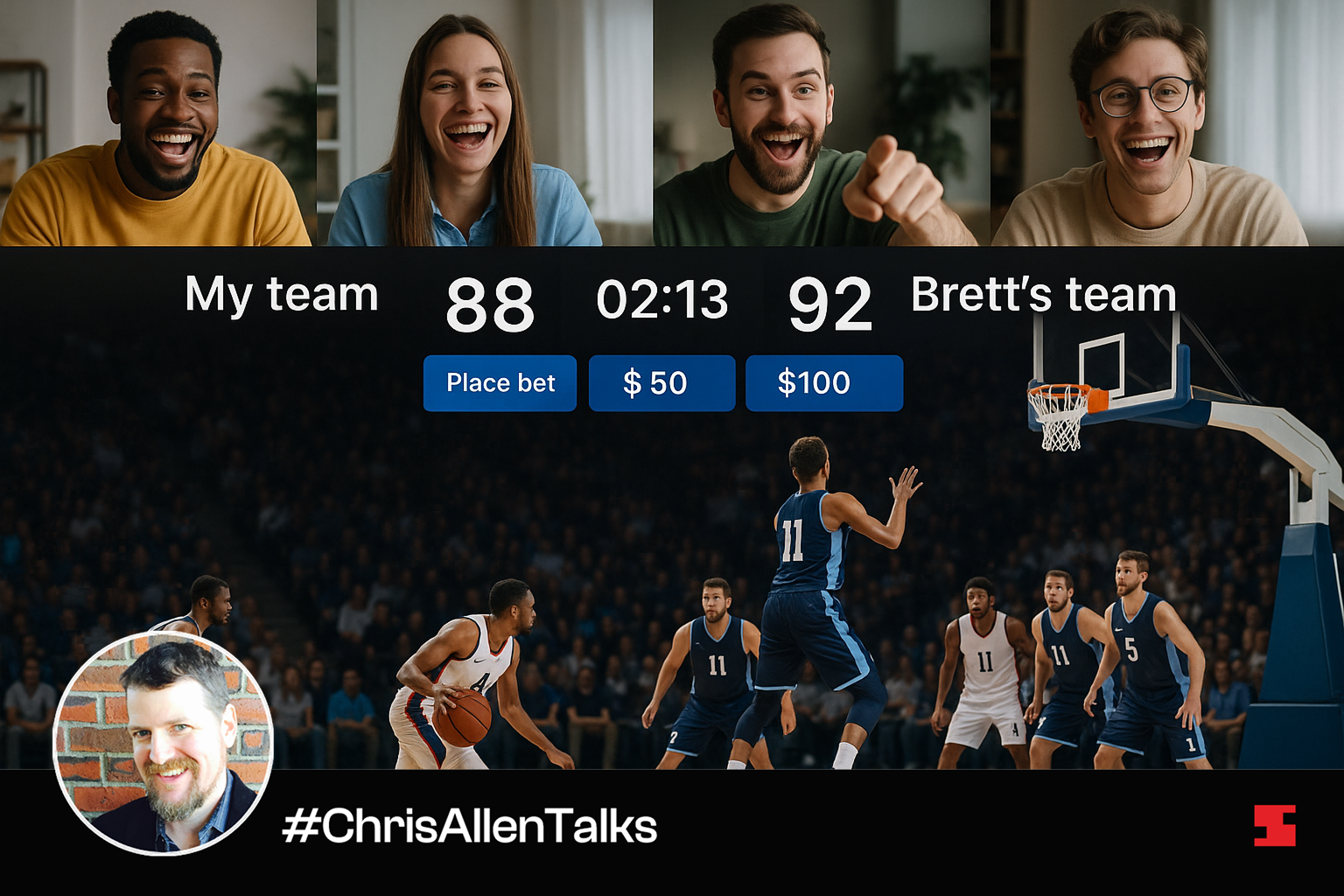I hinted a bit at today’s topic in my last blog post “How Online Auction Software Is Catching Up with Sports Betting Apps and Fan Engagement Platforms.” In this blog, you’ll learn how emerging sports betting industry trends such as real-time streaming, group betting, shifting licensing models, and international market expansion are reshaping the future… Continue reading Sports Betting Industry Trends 2026: Untapped Opportunities in Group Betting, Fan Engagement, and Licensing Rights
I hinted a bit at today’s topic in my last blog post “How Online Auction Software Is Catching Up with Sports Betting Apps and Fan Engagement Platforms.” In this blog, you’ll learn how emerging sports betting industry trends such as real-time streaming, group betting, shifting licensing models, and international market expansion are reshaping the future of fan engagement and platform innovation.
Table of Contents
The Problem With Today’s Sports Betting Apps
According to Grand View Research, the global sports betting market size was estimated at USD 100.9 billion in 2024 and is projected to reach USD 187.39 billion by 2030, growing at a CAGR of 11% from 2025 to 2030. The market growth is primarily driven by the increased access to the internet and mobile phones.
There’s a lot of hype, both warranted and otherwise, about sports betting. Despite all the talk about it, I think we haven’t even scratched the surface of what’s possible. It’s 2025, and the killer app for sports betting hasn’t been created yet. Most sports betting apps today feel transactional and solitary. You place a bet on your phone, maybe send a message to a friend, and that’s it. The energy of the moment just doesn’t come through.
What Casinos Can Teach Sports Betting Apps

Sports betting vs casino gambling.
Sports betting industry trends often focus on market growth and technology, but one of the biggest opportunities lies in emotional engagement. When comparing sports betting to traditional casino betting, the gap becomes clear. If you are like most people and have been to a casino, you’ve seen first hand the dynamic at the craps and roulette tables in a casino. There’s a crowd gathered round. There’s cheering. There’s adrenaline.
Online casinos have taken note. Many now include live dealers and multiplayer formats that recreate the shared energy of in-person gambling. They’ve proven that interactivity and the presence of other players make a difference.
Surprisingly, sports betting apps haven’t fully embraced this. Most still offer a solitary, transactional experience. But what if sports betting apps felt more like a shared experience?
Sports Betting Industry Trends 2026
Social and Watch-Party-Style Betting
I believe that future sports betting experiences will have watch-party-type functionality to make it more exciting. Imagine watching a game remotely with friends via video chat, placing bets together or against each other in real time, all talking trash about the opposing team. Here’s a quick example of what that could look like:
That kind of social interaction could unlock a new level of fan engagement and open up revenue opportunities.
Real-Time Streaming as a Requirement

Real-time streaming is the foundation of high-revenue sports betting applications.
None of these interactive features are possible without real-time streaming infrastructure. For group betting experiences to feel authentic and synchronized, all viewers must stay in sync. What you see on your screen should match what’s happening on the field within milliseconds.
Low-latency streaming technology like WebRTC is critical to enabling this shift.
Shifting Licensing and League Restrictions

Removing sports betting obstacles created by licensing terms.
So why hasn’t this happened yet? Game/league rights are one major blocker. Many sports betting apps are still limited by licensing terms. They can’t always show high-quality streams or use the footage in interactive ways.
But that’s starting to shift. Leagues are reconsidering how they license their content. That opens the door for new formats built with interactivity in mind.
Emerging Markets Like Brazil Are Accelerating Innovation
Watch a short #ChrisAllenTalks video on YouTube.
Since legalization in January, the market has exploded. According to Yogonet, the newly regulated Brazilian sports betting market registered more than 5 billion visits during the quarter, equivalent to over 650 visits per second. The surge marks a dramatic acceleration compared to the second half of 2024, when site traffic remained relatively stable, at 2.55 billion visits in Q3 and 2.66 billion in Q4.
Red5 recently acquired Dale, a Brazilian company that was building a live, interactive, community-driven app for Futbol fans. This positions us well to innovate at the intersection of real-time engagement and newly opened sports betting markets. Being present in a rapidly growing region with fresh legal opportunities gives us a unique advantage to help shape the next wave of sports betting experiences.
I recently sat down with Rafael Gonçalves, our VP of Sales for LATAM, to talk about what is happening on the ground. Spoiler: it is not just hype.
The big insight? Most apps look the same. Same bonuses. Same odds. Same streaming experience. Low resolution, high latency, and no social layer.
But this is where things get interesting.
Real-time video, ultra-low latency, and shared experiences are the differentiators. People do not just want to bet. They want to watch, cheer, talk trash, and win together. Think video chats with friends, live chat rooms, or influencer-driven watch parties, all synced to the same stream within milliseconds of the action.

Sports betting in Brazil 2025.
Conclusion
The sports betting industry is evolving, but most apps still fall short of delivering truly interactive, engaging experiences. Real-time technology, social features like watch parties, and expanding markets such as Brazil are opening new possibilities for innovation. To stay competitive, the next generation of sports betting apps must prioritize emotional engagement, ultra-low latency, and dynamic licensing strategies.
Try Red5 For Free
🔥 Looking for a fully managed, globally distributed streaming PaaS solution? Start using Red5 Cloud today! No credit card required. Free 50 GB of streaming each month.
Looking for a server software designed for ultra-low latency streaming at scale? Start Red5 Pro 30-day trial today!
Not sure what solution would solve your streaming challenges best? Watch a short Youtube video explaining the difference between the two solutions, or reach out to our team to discuss your case.
Chris Allen is the co-founder and CEO of Red5, with over 20 years of experience in video streaming software and real-time systems. A pioneer in the space, he co-led the team that reverse-engineered the RTMP protocol, launching the first open-source alternative to Adobe’s Flash Communication Server. Chris holds over a dozen patents and continues to innovate at the intersection of live video, interactivity, and edge computing. At Red5, he leads the development of TrueTime Solutions, enabling low-latency, synchronized video experiences for clients including NVIDIA, Verizon, and global tech platforms. His current work focuses on integrating AI and real-time streaming to power the next generation of intelligent video applications.

